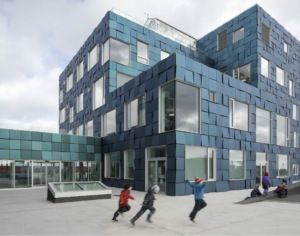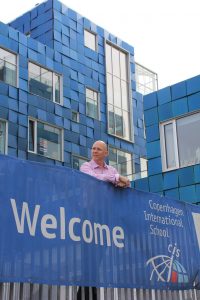News
Interview: Decoding a curriculum with its sights set on the future
This article is more than 4 years old.
Sandy Mackenzie, the Director of Copenhagen International School, reflects on how the International Baccalaureate fosters critical thinking, inner-learning and creativity

Copenhagen International School was one of the founding schools of the International Baccalaureate and today it is one of the global leaders.
It currently educates children representing over 80 nationalities, from the age of three to high school, all the while facilitating a thriving and creative environment for learning.
Nurturing talent
Its unique vision and teaching methods have nurtured talented students, equipping them with the skill set to create a more sustainable and just world.
We caught up with the Director of Copenhagen International School, Sandy Mackenzie, to discuss why the work of the school is as important as ever, and what makes their vision so outstanding in Denmark’s current education landscape.
Copenhagen International School was one of the founding schools of the International Baccalaureate in the 1960s. It’s been quite a journey, hasn’t it?
We have been around for almost 60 years. We were part of a group of schools that started with only the diploma program, before gradually expanding our programs. Our school started with only 30 students and now we are at 900!
I think what shows our success, and why we keep growing, is how our diploma is a premier qualification for university. We hear from universities across the world that they believe that our students are well-prepared and equipped for taking on future challenges. Of course, that speaks for the quality of the teachers in our diverse school.
We have also moved a few times over the years – most recently to our fabulous campus in Nordhavn in January 2017. It is a wonderful campus designed for creative learning and community building that we are missing quite a bit right now, due to COVID restrictions.
What makes Copenhagen International School particularly stand out from other schools that teach the International Baccalaureate?
We are an International Baccalaureate World School, so we have the full continuum where our students begin with the Primary Years Programme and finish it off with the two-year Diploma Programme in High School. All our programs are inquiry-based, meaning those who go through it develop critical thinking about learning, about themselves, and creativity.
In our Diploma Programme, the students take six subjects, of which three are higher level and three are standard level. Those higher-level subjects really go into depth and some would contend that they are taught at a university level. The subjects are a primary language, a secondary language, a humanities subject, a science, Mathematics and Arts.
In our Diploma Programme, the students take six subjects, of which three are higher level and three are standard level. Those higher-level subjects really go into depth and some would argue they have a level of university courses.
In the eighth grade all of our students go on a language trip to improve their secondary language, so if they are studying French they go to France. Unlike other schools, as a part of their curriculum they also go on development projects around the world – for example, to Peru to support a home for abused, abandoned and special needs Peruvian children.
Every young person that graduates from our school has an overview across these six subjects. In comparison to other systems, where a 16-year-old might narrowly focus on one subject, our students are learning holistically.
We also believe school is more than the curriculum, so we facilitate sporting events across the world and involve our students in community building through our wonderful theatre program and such.
Why is it important to teach the kids the values and subjects of the International Baccalaureate from such an early age? How do you think Copenhagen International School prepares its students for the challenges of the real world?
We are fortunate at Copenhagen International School that we have a diverse body of students representing over 80 nationalities. International mindedness is built into our core values and that is very consistent with our mission and vision. We aim to educate champions of a just and sustainable world, and I believe in our ever-more global society that a focus on international mindedness has to be part of this vision.
We have recently articulated five core values that we feel we stand for. They are Inclusion, Integrity, Passion, Creativity and Growth. Our inquiry-based program allows our students to develop these values and an international mindedness that can help them to make the world a better place.
It has become clear that the world has significant challenges, and I think we see it with the coronavirus: that the world is no longer made up of distinct regions and ideas, but issues that are truly global. We believe in equipping young people with skills to apply knowledge and learn differently while being able to collaborate with other people. So, we are equipping them for being part of society in 2030, 2040 and 2050 and so forth.
This past year has also brought a lot of changes to education because of the COVID restrictions and distance learning becoming the new normal. How has Copenhagen International School coped so far?
2020 was an interesting year for us. The coronavirus seems to have hit us, in hindsight, very quickly. We had to adapt to remote learning overnight, and I’ve been incredibly impressed by how our teachers and wider community have responded. We continued our education in a balanced way by ensuring our students get a valuable learning experience whilst maintaining their well-being and connections to others back home. Our parent-to-parent buddy family program is going online so they can also continue to grow their communities.
We also hosted a digital Model United Nations conference, where young people came together from different schools across the world and simulated the work of the UN. There were certain things that were lost, but certain things that were gained by doing it digitally. This connectivity across the world allows our students to gain international mindedness and connections across different societies and social structures, I believe.
Denmark was one of the first countries to reopen schools after the lockdown in April and so we implemented a set of processes based on the government’s recommendations, which became known as the Copenhagen Model by international schools all over the world. In August we found out that many children joined our school based on what their parents had heard about how we had reopened our campus successfully! Now, since December, we have returned to remote learning, but we were able to take the experiences from March and make this period better and more successful.
We have learned several things. One is the capacity of people to change – that we were able to move overnight to a completely different environment for learning. Two, our community is super important and continues to be. And three, the opportunity digital learning is providing for flexibility and allowing for personalised learning.
Hence, in the long-term, we have taken all these lessons and we will continue to make our education even better.











































